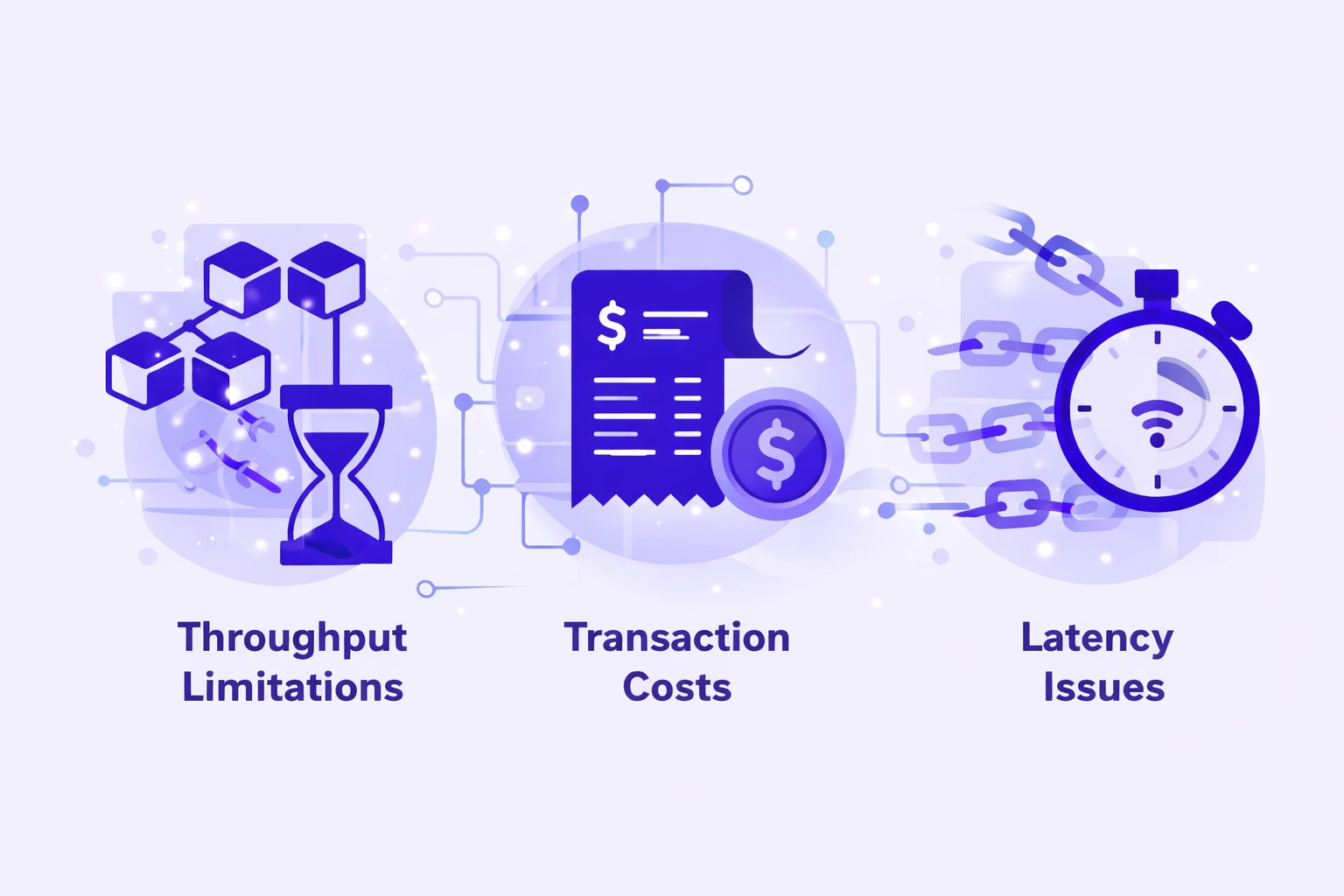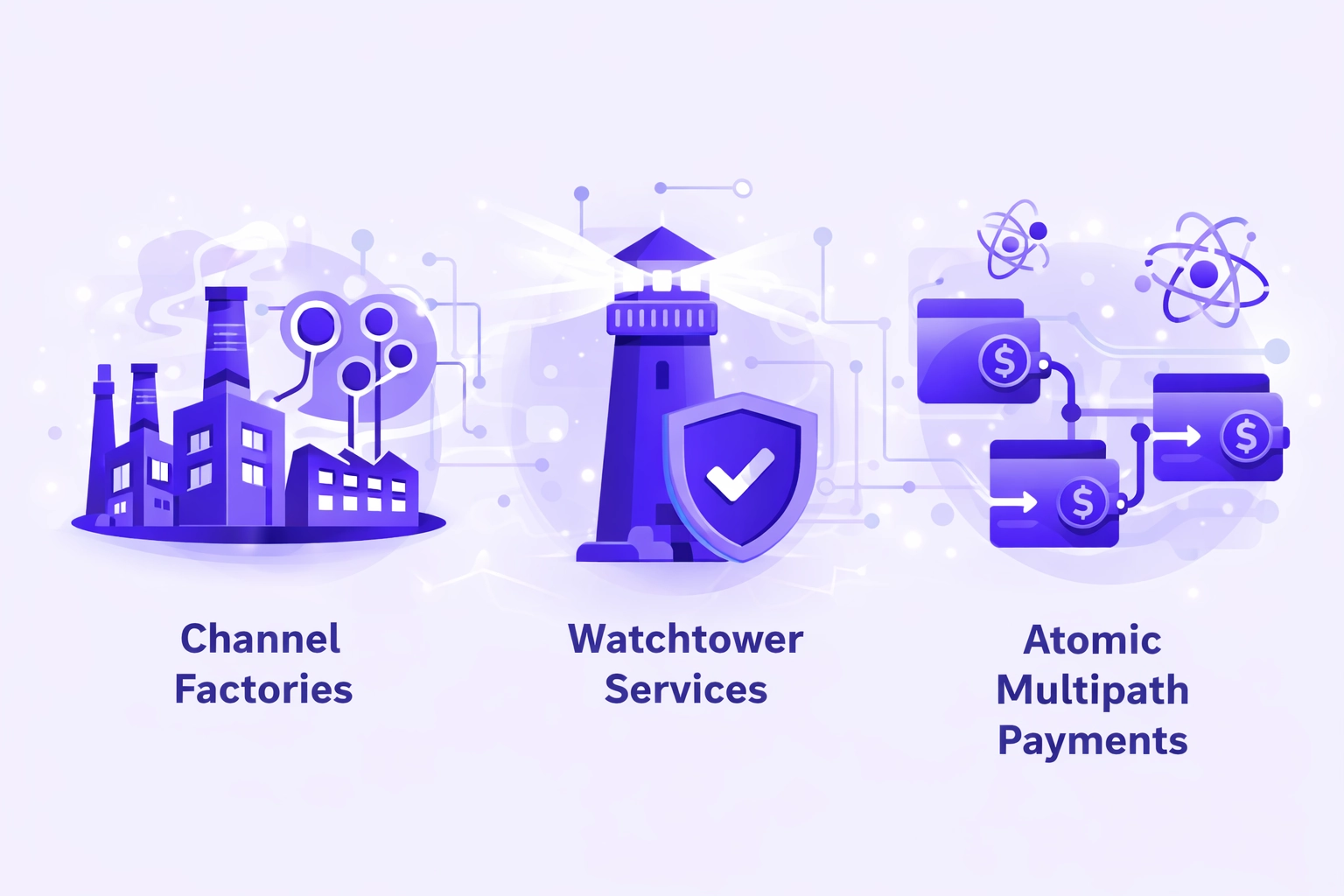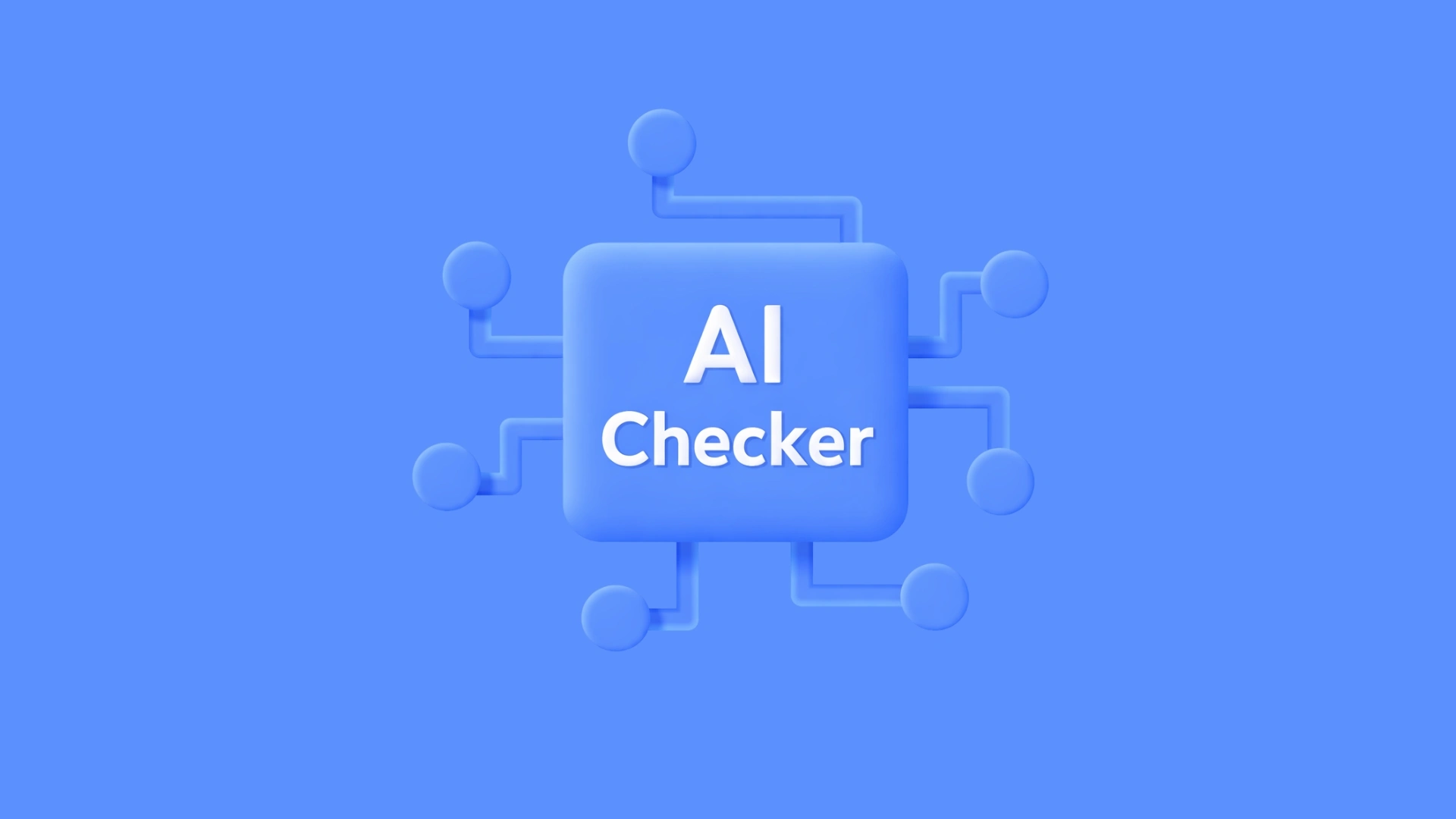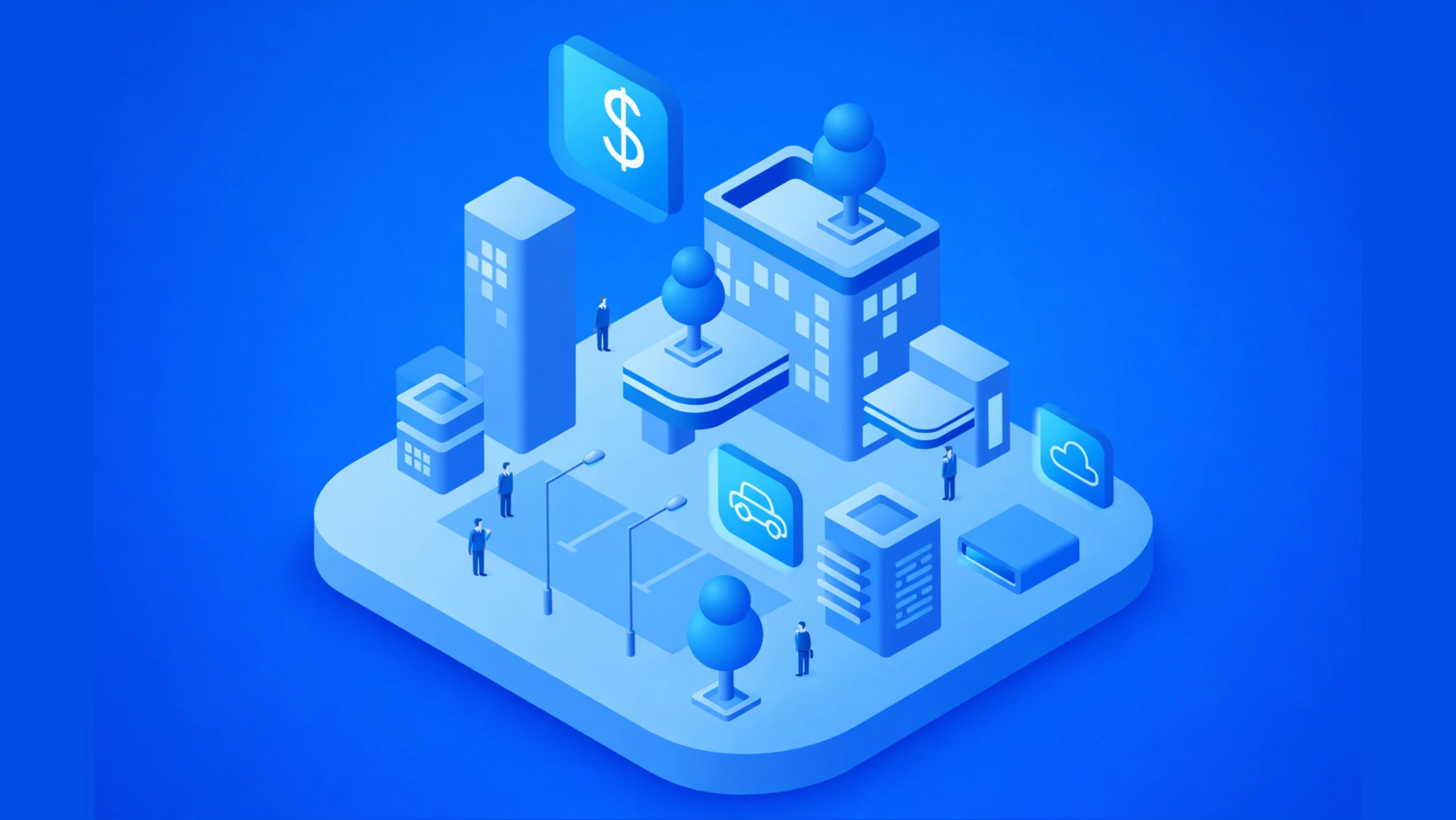Key Takeaways
- Payment Channel Contracts enable off-chain transaction processing while maintaining blockchain security guarantees, reducing costs by over 90% in high-volume scenarios.
- These smart contract protocols support both unidirectional and bidirectional value transfers, accommodating diverse commercial relationships and payment patterns across global markets.
- Channel lifecycles involve three distinct phases: establishment with on-chain funding, unlimited off-chain transaction execution, and final settlement back to the blockchain.
- Security mechanisms including cryptographic signatures, time-locked commitments, and penalty systems protect participants from fraudulent behavior during channel operations.
- Payment channels significantly improve blockchain scalability by processing thousands of transactions off-chain for every on-chain settlement, addressing throughput limitations.
- Industries across USA, UK, UAE, and Canada implementing payment channels include gaming, streaming media, remittances, supply chain automation, and financial services.
- Technical limitations include capital lockup requirements, online monitoring obligations, routing complexity, and channel rebalancing challenges that impact user experience.
- Advanced constructs like channel factories, virtual channels, and network routing protocols extend basic payment channel functionality for enterprise applications.
Introduction to Payment Channel Contracts in Blockchain
Blockchain technology revolutionized digital transactions by eliminating intermediaries and providing transparent, immutable record-keeping. However, the fundamental design of public blockchains creates inherent limitations in transaction throughput and cost efficiency. Every transaction must be validated by network participants, recorded permanently on the distributed ledger, and synchronized across thousands of nodes worldwide. This architecture ensures security and decentralization but introduces significant latency and expense.
Payment Channel Contracts emerged as a practical solution to these scalability challenges. These sophisticated smart contract protocols enable parties to conduct numerous transactions off the main blockchain while preserving the security guarantees that make distributed ledgers valuable. By creating temporary bilateral payment pathways, participants can exchange value rapidly and inexpensively, settling only the final net position on-chain.
Financial institutions across major markets in the United States, United Kingdom, and United Arab Emirates have recognized the transformative potential of payment channels. These mechanisms support use cases ranging from micropayments in digital content platforms to high-frequency trading in regulated securities markets. As blockchain adoption accelerates globally, understanding Payment Channel Contracts becomes essential for organizations seeking to leverage distributed ledger technology without sacrificing performance or cost efficiency.
What Are Payment Channel Contracts?
Payment Channel Contracts are specialized smart contracts that establish secure, off-chain transaction pathways between two parties. These contracts function as programmable escrow mechanisms, locking funds on the blockchain while enabling participants to update their respective balances through cryptographically signed messages. The blockchain records only the channel’s opening and closing states, while intermediate transactions occur entirely off-chain.
The fundamental innovation lies in replacing numerous on-chain transactions with a series of signed state updates. Each update represents a new balance distribution within the locked funds. Participants exchange these updates directly without blockchain involvement, achieving near-instantaneous settlement at minimal cost. Only when parties decide to close the Payment Channel Contracts does the final state get recorded on-chain, distributing funds according to the latest agreed-upon balances.
Industry Insight: Payment Channel Contracts represent a fundamental shift from recording every transaction to recording only meaningful state changes. This architectural approach mirrors traditional banking batch processing but with cryptographic guarantees replacing institutional trust.
These Payment Channel Contracts incorporate sophisticated mechanisms to prevent fraud and ensure honest participation. Time-locked commitments allow parties to challenge dishonest closure attempts. Penalty systems punish participants who try to submit outdated Payment Channel Contracts states. Digital signatures authenticate every transaction update, creating an immutable audit trail despite the off-chain execution environment.
Why Blockchain Transactions Need Payment Channels
Public blockchains face inherent constraints that limit their capacity to process transactions at scale. Bitcoin processes approximately seven transactions per second, while Ethereum handles around fifteen. Traditional payment networks like Visa process thousands of transactions per second during peak periods. This disparity creates significant barriers for blockchain adoption in high-volume commercial applications.

Core Scalability Challenges Addressed by Payment Channels
Throughput Limitations
- Network consensus requirements create processing bottlenecks that restrict transaction volume
- Block size limits and block time intervals constrain how many transactions can be included
- Global node synchronization demands prevent rapid transaction confirmation
Transaction Costs
- Gas fees fluctuate dramatically based on network congestion levels and demand
- Micropayments become economically infeasible when fees exceed transaction values
- Enterprise applications requiring thousands of daily transactions face prohibitive costs
Latency Issues
- Block confirmation times range from seconds to minutes depending on the network
- User experience suffers when payments require multiple confirmation blocks
- Real-time applications like gaming or streaming require instant transaction finality
Beyond raw performance metrics, transaction costs create economic barriers to blockchain adoption. During periods of network congestion, Ethereum gas fees have exceeded fifty dollars for simple transactions. These costs make blockchain impractical for everyday payments, subscription services, or any application involving frequent, low-value transfers. Businesses in competitive markets like Canada and the UK cannot justify these expenses for routine operations.
Payment Channel Contracts directly address these limitations by fundamentally changing the transaction model. Instead of broadcasting every payment to the entire network, Payment Channel Contracts enable bilateral value exchange that only requires blockchain involvement at key moments. This approach reduces both the computational burden on the network and the costs borne by participants, enabling blockchain technology to support use cases previously considered impractical.
How Payment Channels Work – A High-Level Overview
The operational mechanics of Payment Channel Contracts involve three distinct phases that balance security with efficiency. Understanding this workflow helps organizations evaluate whether payment Payment Channel Contracts suit their specific transaction patterns and business requirements. The process begins with channel establishment, proceeds through unlimited transaction execution, and concludes with final settlement.
During the establishment phase, both parties commit funds to a multi-signature smart contract deployed on the blockchain. This contract acts as a programmatic escrow, holding assets that can only be released according to predefined rules. The initial funding transaction represents the first of only two on-chain operations required for the entire channel lifecycle, regardless of how many transactions occur within the Payment Channel Contracts.
Once established, participants exchange signed transaction updates directly between themselves without blockchain involvement. Each update represents a new balance distribution and includes cryptographic signatures from both parties. These updates can occur thousands of times per second limited only by network latency between participants. Every new update supersedes previous states, with sequence numbers preventing replay attacks and ensuring parties can identify the most recent valid state.
Channel closure represents the final phase where the most recent agreed-upon state gets submitted to the blockchain for settlement. Either party can initiate closure by broadcasting the latest signed state update. The smart contract verifies signatures, enforces any time delays required for dispute resolution, and distributes funds according to the final balances. This second on-chain transaction completes the Payment Channel Contracts lifecycle and returns control of assets to individual participants.
On-Chain vs Off-Chain Transactions Explained
Understanding the distinction between on-chain and off-chain transactions is fundamental to appreciating how Payment Channel Contracts achieve their performance advantages. On-chain transactions involve broadcasting transaction data to the entire network, where validators process, verify, and permanently record the transaction in the blockchain. This process provides strong security guarantees but incurs significant costs in time and money.
| Characteristic | On-Chain Transactions | Off-Chain Transactions |
|---|---|---|
| Processing Location | Distributed across entire network nodes | Between participants only, no network broadcast |
| Confirmation Time | Minutes to hours depending on network | Milliseconds with instant finality |
| Transaction Cost | Gas fees from $0.10 to $50+ per transaction | Negligible computational costs only |
| Public Visibility | All transactions visible on public ledger | Private between participants until settlement |
| Immutability | Permanent blockchain record once confirmed | State updates until final settlement on-chain |
| Scalability Impact | Each transaction consumes network capacity | No network impact during channel operation |
Off-chain transactions in Payment Channel Contracts maintain security through cryptographic commitments rather than network consensus. Each transaction update is signed by both parties, creating legally binding commitments that can be enforced on-chain if necessary. This approach trades immediate global consensus for bilateral agreement, dramatically improving performance while preserving the ability to settle disputes through blockchain adjudication.
The privacy characteristics also differ significantly. On-chain transactions are publicly visible to anyone examining the blockchain, though participant identities may be pseudonymous. Off-chain Payment Channel Contracts transactions remain private between participants until final settlement. This privacy advantage appeals to businesses in competitive markets across Dubai, London, and New York who prefer not to expose transaction patterns to competitors or the public.
Types of Payment Channels in Blockchain Networks
Payment channels have evolved through several architectural variations, each optimized for specific transaction patterns and use cases. Understanding these different types helps organizations select appropriate implementations for their particular requirements. The two primary categories are unidirectional and bidirectional Payment Channel Contracts, though more sophisticated variants have emerged to address specific limitations.
Payment Channel Architecture Variants
Unidirectional Channels
- Value flows in single direction from sender to receiver throughout channel lifetime
- Simpler implementation with reduced computational complexity and lower gas costs
- Ideal for subscription services, content micropayments, and streaming payment models
- Sender cannot receive payments back through same channel structure
Bidirectional Channels
- Enables value transfer in both directions between channel participants
- More complex smart contract logic with additional security considerations
- Supports trading relationships, mutual commerce, and balanced transaction flows
- Foundation for network routing protocols like Lightning Network
Virtual Channels
- Established through intermediary without direct on-chain funding transaction
- Reduces blockchain footprint by leveraging existing channel infrastructure
- Enables rapid channel creation between parties sharing common intermediaries
- Advanced construct requiring sophisticated routing and commitment protocols
Unidirectional channels represent the simpler implementation, where value moves exclusively from one party to another. This architecture suits scenarios like content subscriptions where consumers make ongoing payments to providers. The reduced complexity translates to lower gas costs and simpler dispute resolution mechanisms. However, the one-way nature limits applicability to balanced commercial relationships.
Implement Payment Channel Contracts for Your Blockchain Platform
Ready to reduce transaction costs by 90% and achieve millisecond settlement speeds? Our blockchain experts specialize in Payment Channel Contracts implementation.
Bidirectional channels add complexity but enable much broader use cases. Both parties can send and receive payments throughout the channel lifetime, supporting dynamic commercial relationships. The Lightning Network on Bitcoin and Raiden Network on Ethereum both utilize bidirectional channels to create payment routing networks. These networks allow payments between parties without direct Payment Channel Contracts by routing value through intermediate nodes.
Virtual channels represent an advanced optimization that reduces on-chain footprint even further. Instead of establishing direct channels between all potential counterparties, virtual channels leverage existing intermediaries. Two parties sharing a common Payment Channel Contracts partner can establish a virtual channel through that intermediary without any on-chain transaction. This approach significantly improves capital efficiency and reduces blockchain congestion in large-scale payment networks.
Lifecycle of a Payment Channel Contract
The complete lifecycle of a Payment Channel Contract encompasses multiple stages from initial negotiation through final settlement. Each stage involves specific technical operations and carries distinct security considerations that participants must understand to operate Payment Channel Contracts safely and efficiently.
Payment Channel Contract Lifecycle
Channel Parameters Negotiation
Participants agree on channel capacity, dispute resolution timeframes, fee structures, and technical specifications before deployment.
Smart Contract Deployment
Multi-signature contract is deployed to blockchain with agreed parameters, creating the escrow mechanism for channel funds.
Initial Funding Transaction
Both parties send cryptocurrency to the contract address, locking funds that will back all subsequent off-chain transactions.
Off-Chain Transaction Execution
Participants exchange signed balance updates directly, conducting unlimited transactions without blockchain involvement or fees.
Channel Monitoring
Participants or watchtower services monitor blockchain for fraudulent closure attempts using outdated channel states.
Closure Initiation
Either party broadcasts most recent signed state to blockchain, beginning settlement process with dispute resolution period.
Dispute Resolution Window
Time-locked period allows counterparty to challenge submitted state with more recent update if fraud attempted.
Final Settlement and Fund Distribution
After dispute window expires, smart contract distributes locked funds according to final agreed balances, completing lifecycle.
The negotiation phase establishes crucial parameters that govern channel operation. Parties must agree on total channel capacity, which determines maximum transaction sizes and channel liquidity. Dispute resolution timeframes balance fraud prevention against capital efficiency, with longer windows providing more security but delaying settlement. Technical specifications include communication protocols, cryptographic algorithms, and state update formats.
Channel monitoring represents a critical operational requirement throughout the channel lifetime. Participants must detect if their counterparty attempts fraudulent closure using outdated states. While continuous personal monitoring proves impractical, watchtower services have emerged as third-party solutions that monitor channels on behalf of users. These services charge fees but enable secure channel operation without constant online presence requirements.
How Payment Channels Optimize Transaction Speed
Transaction speed optimization represents one of the most compelling advantages of Payment Channel Contracts. Traditional blockchain transactions face latency from network propagation, block production intervals, and confirmation requirements. Payment channels eliminate these delays by removing the blockchain from the transaction critical path entirely during Payment Channel Contracts operation.[1]
Off-chain transactions achieve finality limited only by network communication between participants. In typical internet conditions, state updates can be exchanged and confirmed in milliseconds. This performance enables real-time applications impossible with on-chain settlement. Gaming platforms can process microtransactions for every action, streaming services can bill per second of content consumed, and trading platforms can support high-frequency strategies.
The speed advantage becomes even more pronounced for transaction sequences. Traditional blockchains require separate confirmations for each transaction, creating compounding delays. Payment channels process unlimited transactions at consistent millisecond latency regardless of transaction count. A thousand transactions complete as quickly as a single transaction, enabling use cases requiring rapid successive operations.
Organizations in high-velocity markets including financial trading firms in New York and London have deployed payment Payment Channel Contracts specifically for this performance characteristic. Algorithmic trading strategies that generate thousands of transactions per second become viable when settlement occurs off-chain. The ability to execute and confirm trades in single-digit milliseconds creates competitive advantages impossible with traditional blockchain settlement.
Reducing Gas Fees Using Payment Channel Contracts
Gas fee reduction represents perhaps the most immediately tangible benefit of Payment Channel Contracts for most users and businesses. Ethereum gas fees fluctuate wildly based on network demand, with simple transfers costing anywhere from a few dollars to over fifty dollars during congestion periods. For businesses processing thousands of transactions daily, these costs quickly become prohibitive.
Payment channels dramatically reduce costs by amortizing the fixed expense of two on-chain transactions across unlimited off-chain operations. Consider a business processing one thousand transactions per month. With traditional on-chain settlement at five dollars per transaction, monthly costs reach five thousand dollars. The same volume through a payment channel incurs only two on-chain transactions totaling ten dollars, representing a 99.8% cost reduction.
Cost Optimization Principle: Payment Channel Contracts transform variable transaction costs into fixed infrastructure costs. The more transactions processed through a channel, the lower the effective per-transaction cost becomes, creating strong incentives for high-volume applications.
The economics become even more favorable for micropayments. A content platform charging ten cents per article cannot function when gas fees exceed one dollar. Payment channels enable economically viable micropayments by eliminating per-transaction fees entirely. Publishers in markets across Canada and the United Kingdom have implemented payment channels specifically to support micropayment business models impossible with traditional blockchain settlement.
However, organizations must consider capital efficiency trade-offs. Payment Channel Contracts require locking funds upfront, creating opportunity costs. The optimal channel size and duration depend on transaction patterns, capital costs, and gas fee volatility. Sophisticated users employ dynamic strategies, opening channels when gas prices are low and sizing them based on projected transaction volumes.
Security Model of Payment Channels and Smart Contracts
The security architecture of Payment Channel Contracts relies on cryptographic commitments and economic incentives rather than continuous blockchain validation. This model provides strong guarantees while enabling off-chain operation, though participants must understand the specific trust assumptions and security requirements involved.
Each state update in a payment Payment Channel Contracts is cryptographically signed by both participants using their private keys. These signatures create legally binding commitments that can be verified by the smart contract during settlement. The contract logic enforces that only properly signed states with valid sequence numbers can be submitted for settlement, preventing unauthorized fund movements.
Core Security Mechanisms in Payment Channels
Cryptographic Signatures
- Every state update requires valid signatures from both channel participants
- Signature verification ensures only authorized parties can modify balances
- Private key control provides same security level as blockchain transactions
- Multi-signature requirements prevent unilateral unauthorized actions
Time-Locked Commitments
- Dispute resolution windows allow challenges to potentially fraudulent closures
- Time delays provide opportunity to submit more recent valid states
- Configurable lock periods balance security against capital efficiency
- Smart contract enforces timing constraints automatically without human intervention
Penalty Mechanisms
- Fraudulent closure attempts result in complete channel balance forfeiture
- Economic disincentives make dishonesty financially irrational for participants
- Penalty severity ensures honest behavior remains dominant strategy
- Smart contract automatically enforces punishments without arbitration
The time-lock mechanism represents a crucial security component. When a participant initiates channel closure, the smart contract enforces a waiting period before finalizing settlement. During this window, the counterparty can submit a more recent state if the closing party attempted fraud. This challenge mechanism ensures honest participants can always protect their funds even if offline when closure is initiated.
Penalty systems provide economic security through game theory. If a participant tries to close the channel with an outdated state favorable to themselves, the counterparty can prove fraud by submitting a newer signed state. The smart contract then awards the entire channel balance to the honest party as punishment. This harsh penalty makes attempted fraud economically irrational, ensuring honest participation.
Financial institutions in regulated markets including the UAE and United States have conducted extensive security audits of payment channel implementations. These assessments consistently validate the cryptographic security model when properly implemented. However, operational security requires participants to maintain secure key storage, implement monitoring systems, and follow best practices for state management throughout the channel lifecycle.
Role of Payment Channels in Blockchain Scalability
Blockchain scalability represents one of the technology’s most significant challenges, limiting mainstream adoption and practical utility. Payment Channel Contracts address scalability through a Layer 2 approach that processes transactions off the base blockchain while maintaining security guarantees. This architectural pattern has become central to scalability roadmaps across major blockchain platforms.
| Scalability Metric | Base Layer Blockchain | With Payment Channels | Improvement Factor |
|---|---|---|---|
| Transactions Per Second | 7-15 TPS typical | Millions TPS potential | 100,000x+ |
| Transaction Finality | Minutes to hours | Milliseconds | 10,000x+ |
| Cost Per Transaction | $0.10 to $50+ | Near zero effective cost | 1,000x+ |
| Network Congestion Impact | Severe during peak usage | Minimal impact on channels | Substantial reduction |
| Privacy Level | All transactions public | Only settlement visible | Significantly enhanced |
The scalability improvement from payment channels extends beyond raw transaction throughput. By reducing blockchain load, channels help prevent network congestion that would otherwise degrade performance for all users. This collective benefit creates positive network effects as more participants adopt channel-based transactions, improving overall ecosystem health.
Payment channels also enable vertical scalability by allowing individual channels to process transactions at rates limited only by participant hardware and network connectivity. While horizontal scaling through sharding or multiple chains faces coordination challenges, payment channels achieve massive throughput increases through architectural simplification rather than distributed consensus optimization.
Real-World Use Cases of Payment Channel Contracts
Payment Channel Contracts have moved beyond theoretical constructs to power real production systems serving millions of users globally. These implementations demonstrate practical viability and highlight both the strengths and limitations of current payment channel technology across diverse application domains.
The Lightning Network represents the most prominent payment channel deployment, operating atop Bitcoin to enable rapid, low-cost transactions. With thousands of nodes and substantial locked capacity, Lightning supports use cases from coffee purchases to cross-border remittances. Merchants across the United States and Canada increasingly accept Lightning payments, demonstrating mainstream commercial viability for channel-based transactions.
Active Payment Channel Implementations
Micropayment Platforms
- Content platforms enabling per-article or per-video micropayments without prohibitive fees
- Gaming applications processing thousands of small in-game transactions daily
- Streaming services implementing per-second billing models economically
International Remittances
- Cross-border payment services reducing transfer costs from 7% to under 1%
- Near-instant settlement replacing multi-day traditional banking processes
- Expanding financial access in underbanked regions globally
Machine-to-Machine Payments
- IoT devices conducting automated microtransactions for services consumed
- Supply chain systems enabling real-time payment settlement between components
- Energy grids facilitating peer-to-peer electricity trading at household level
Gaming platforms have emerged as particularly successful payment channel adopters. Games generating thousands of microtransactions per player session cannot function economically with traditional blockchain settlement. Payment channels enable in-game economies with instant transactions and negligible costs, supporting business models from virtual item trading to play-to-earn mechanics.
Financial technology firms in Dubai and Singapore are exploring payment channels for securities settlement and interbank transfers. These regulated applications require enterprise-grade reliability and compliance integration, pushing payment channel technology toward institutional standards. Early pilots demonstrate significant cost savings and settlement time reductions compared to traditional clearing processes.
Payment Channels vs Sidechains vs Rollups
The blockchain scalability landscape includes multiple Layer 2 approaches, each with distinct architectural characteristics and trade-offs. Understanding how payment channels compare to alternative scaling solutions helps organizations select appropriate technologies for their specific requirements and constraints.
| Feature | Payment Channels | Sidechains | Rollups |
|---|---|---|---|
| Security Model | Inherits base layer security fully | Independent consensus mechanism | Inherits base layer security |
| Capital Requirements | Funds locked per channel | Bridge deposits required | Deposits to rollup contract |
| Transaction Scope | Between channel participants only | All sidechain users globally | All rollup users globally |
| Setup Complexity | Simple bilateral contract | Full blockchain infrastructure | Complex sequencer architecture |
| Best Use Case | Recurring bilateral payments | Specialized application chains | General transaction scaling |
Sidechains operate as independent blockchains with their own consensus mechanisms, connected to the main chain through bidirectional bridges. While offering more flexibility than payment channels, sidechains introduce additional trust assumptions and security considerations. The independent consensus means sidechain security depends on validator behavior rather than inheriting main chain guarantees.
Rollups batch multiple transactions into single on-chain submissions, compressing data and sharing gas costs across many operations. Unlike payment channels limited to bilateral transactions, rollups support general computation and unrestricted transaction patterns. However, rollups still require periodic on-chain data submission, creating costs absent in pure payment channels.
Many blockchain architects view these technologies as complementary rather than competitive. Payment channels excel for frequent transactions between established counterparties, sidechains suit specialized application requirements, and rollups provide general-purpose scaling. Sophisticated systems may employ multiple approaches simultaneously, selecting the optimal technology for each specific transaction pattern.
Challenges and Limitations of Payment Channel Contracts
Despite significant advantages, Payment Channel Contracts face meaningful limitations that constrain their applicability and create barriers to adoption. Understanding these challenges helps organizations make informed decisions about when payment channels represent appropriate solutions versus when alternative approaches might prove more suitable.
Critical Operational Limitations
Capital Lockup Requirements
Participants must commit funds upfront for channel duration, creating liquidity constraints and opportunity costs that may exceed gas savings for infrequent transactions.
Online Requirement
Users must periodically monitor channels to detect fraud attempts, though watchtower services provide third-party monitoring at additional cost.
Routing Complexity
Multi-hop payments through intermediaries introduce failure points, require path discovery algorithms, and face liquidity limitations in payment routing networks.
Channel Rebalancing
Unidirectional value flow depletes channel capacity in one direction, requiring periodic rebalancing operations or channel closure and reopening.
User Experience Friction
Channel setup delays, capacity management, and technical complexity create barriers for non-technical users compared to simple on-chain transactions.
Limited Participant Scope
Direct channels only support transactions between two specific parties, requiring network routing or multiple channels for diverse payment needs.
Capital efficiency represents one of the most significant practical limitations. Organizations must balance channel capacity against opportunity costs of locked funds. A business requiring transactions with one hundred different counterparties faces challenging capital allocation decisions when establishing channels with each partner. This capital requirement creates barriers particularly acute in capital-constrained markets.
The user experience challenges extend beyond technical complexity to include philosophical differences from traditional payment systems. Users accustomed to sending payments to any recipient at any time find channel-based restrictions unintuitive. Educational requirements increase adoption friction, particularly in consumer-facing applications where user patience for complexity remains limited.
Routing failures in multi-hop networks create reliability concerns that do not exist with direct on-chain transactions. Path-finding algorithms must identify routes with sufficient liquidity at each hop, and any intermediate node failure aborts the entire payment. These reliability challenges have prompted significant research into routing optimization, channel rebalancing strategies, and network topology design.
Future of Payment Channels in Blockchain Payment Systems
Payment Channel Contract technology continues evolving rapidly, with ongoing research addressing current limitations and expanding capabilities. Multiple development trajectories promise to enhance payment channel utility, improve user experience, and enable new application categories that leverage off-chain transaction processing.
Channel factories represent an important innovation that reduces on-chain footprint by enabling multiple payment channels to share a single funding transaction. Groups of participants can collectively fund a factory contract, then create numerous internal channels without additional blockchain transactions. This approach dramatically improves capital efficiency and reduces setup costs for organizations managing many bilateral payment relationships.

Emerging Payment Channel Innovations
Channel Factories
- Multiple channels share single on-chain transaction reducing blockchain footprint
- Improved capital efficiency through shared liquidity pools across participants
- Dynamic channel creation and modification without blockchain settlement
Watchtower Services
- Third-party monitoring eliminates continuous online requirements for users
- Automated fraud detection and challenge submission during dispute windows
- Subscription models making channels practical for mobile and intermittent users
Atomic Multipath Payments
- Large payments split across multiple routes improving success probability
- Better liquidity utilization in payment routing networks
- Atomic guarantees ensure all payment parts succeed or fail together
Integration with other Layer 2 technologies creates powerful hybrid architectures. Payment channels can operate atop rollups, combining the unlimited transaction capacity of channels with the flexible participant scope of rollup-based settlement. This layered approach enables applications benefiting from both technologies simultaneously, supporting complex transaction patterns impossible with either solution alone.
Cross-chain payment channels represent another frontier, enabling atomic transfers between different blockchains without trusted intermediaries. These protocols use hash time-locked contracts and cryptographic commitments to coordinate payments across disparate networks. Success in this domain could dramatically improve blockchain interoperability while maintaining the security and cost benefits that make payment channels attractive.
Regulatory clarity continues improving as financial authorities in jurisdictions including the UK, USA, and UAE develop frameworks addressing payment channel operations. Clear regulatory guidance enables institutional adoption that was previously constrained by compliance uncertainty. As legal frameworks mature, enterprise payment channel deployments are expected to accelerate across regulated industries from banking to securities trading.
Strategic Perspective on Payment Channels
Payment Channel Contracts represent a mature, proven technology for blockchain scaling that addresses fundamental limitations in transaction throughput and cost. While not suitable for all use cases, channels provide unmatched performance for high-frequency bilateral payments and form critical infrastructure in the evolving blockchain ecosystem. Organizations evaluating blockchain implementation should carefully assess whether their transaction patterns align with payment channel strengths, recognizing that optimal blockchain architectures often combine multiple scaling approaches tailored to specific application requirements.
Frequently Asked Questions
Payment Channel Contracts are smart contract protocols that enable two parties to conduct multiple transactions off the main blockchain while maintaining security guarantees. These contracts create a temporary, bilateral payment pathway where participants can exchange value repeatedly without recording every transaction on-chain. Only the opening and closing states are settled on the blockchain, significantly reducing costs and latency. This mechanism is particularly valuable in high-frequency payment scenarios where speed and cost efficiency are critical. Payment channels form the foundation of Layer 2 scaling solutions.
Payment Channel Contracts minimize costs by batching multiple transactions into two on-chain settlements. Instead of paying gas fees for every individual transaction, users only incur blockchain costs when opening and closing the channel. All intermediate transactions occur off-chain through cryptographically signed updates between participants. This approach can reduce transaction costs by over 90% in high-volume scenarios. Businesses in the USA, UK, and UAE implementing payment channels report substantial savings in operational expenses while maintaining transaction security and finality guarantees.
Unidirectional payment channels allow value transfer in only one direction from sender to receiver, suitable for subscription services or content micropayments. Bidirectional channels enable value flow in both directions, supporting more complex commercial relationships and trading scenarios. Unidirectional channels are simpler to implement with lower computational overhead, while bidirectional channels offer greater flexibility for mutual transactions. The Lightning Network primarily uses bidirectional channels, whereas earlier implementations like Bitcoin’s payment channels were unidirectional. Selection depends on specific use case requirements and complexity tolerance.
Payment Channel Contracts provide strong security guarantees through cryptographic commitments and blockchain settlement mechanisms. Each off-chain transaction is cryptographically signed by both parties, creating an immutable audit trail. Smart contract logic enforces honest behavior through penalty mechanisms that punish fraudulent closure attempts. If disputes arise, participants can submit the latest valid state to the blockchain for adjudication. Security audits from reputable firms in Canada, UK, and USA consistently validate well-implemented payment channel protocols. However, users must maintain channel monitoring to detect and respond to potential fraud attempts.
Payment Channel Contracts require both parties to lock capital upfront, creating liquidity constraints for participants. Channels work best for repeated transactions between established counterparties rather than spontaneous payments to new recipients. Users must remain online periodically to monitor for fraudulent channel closures, though watchtower services can mitigate this requirement. Routing payments across multiple channels introduces complexity and potential failure points. Channel rebalancing can become necessary as liquidity shifts directionally. These limitations have spurred innovation in channel factories, virtual channels, and other advanced constructs to improve usability.
Payment Channel Contracts dramatically increase transaction throughput by moving the majority of transactions off the main blockchain. A single channel can theoretically support unlimited transactions between two parties with only two on-chain settlements. Network-wide, payment channels can increase effective capacity by 1000x or more compared to base layer processing. This scalability improvement occurs without compromising the security properties of the underlying blockchain. Markets in Dubai and other financial centers are exploring payment channels to support high-frequency trading and micropayment applications that would be impractical on-chain.
Industries with high-frequency, low-value transactions gain maximum benefit from Payment Channel Contracts. Gaming platforms use channels for in-game micropayments and reward distributions. Content streaming services implement channels for per-second billing models. International remittance providers leverage channels to reduce cross-border transfer costs. Supply chain networks use channels for automated machine-to-machine payments. Financial services firms in regulated markets like the UK and Canada deploy channels for securities settlement and interbank transfers. Any business model requiring rapid, cost-effective value exchange between recurring counterparties should evaluate payment channel implementation.
Reviewed & Edited By

Aman Vaths
Founder of Nadcab Labs
Aman Vaths is the Founder & CTO of Nadcab Labs, a global digital engineering company delivering enterprise-grade solutions across AI, Web3, Blockchain, Big Data, Cloud, Cybersecurity, and Modern Application Development. With deep technical leadership and product innovation experience, Aman has positioned Nadcab Labs as one of the most advanced engineering companies driving the next era of intelligent, secure, and scalable software systems. Under his leadership, Nadcab Labs has built 2,000+ global projects across sectors including fintech, banking, healthcare, real estate, logistics, gaming, manufacturing, and next-generation DePIN networks. Aman’s strength lies in architecting high-performance systems, end-to-end platform engineering, and designing enterprise solutions that operate at global scale.






